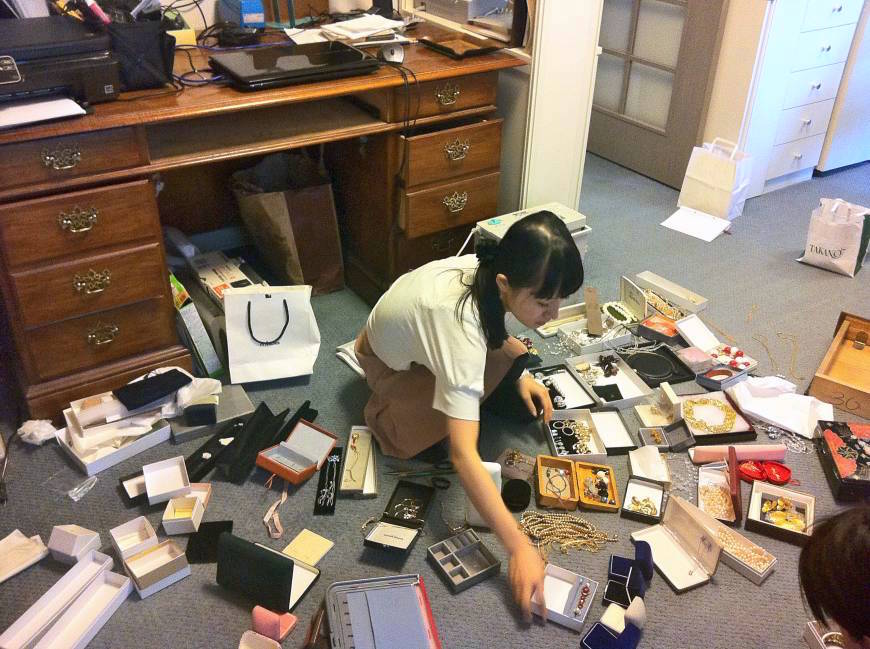If you haven’t noticed by now, January 2019 has been overtaken by a little Japanese lady by the name of Marie Kondo.
Some of us might have known about her for years as the professional organiser on YouTube who has taught thousands how to fold their clothes and arrange their drawers. She’s also the author of the bestselling self-help book, “The Life-changing Magic of Tidying Up”.

And with Netflix producing an entire series on her cleaning escapades, she’s now set most of the first world into an upheaval of sorts with her trademark KonMari method of organising everything you own.
Her method is logical and systematic, and above traditional tidying, considers the psychological aspects of sentimentality and the irrationality of man (i.e. why do things still get messy if being neat is clearly the proper way to live?). It’s simple, sensitive and all round compelling. Why else would the KonMari method be applied in millions of households?
Seeing so many of my friends cleaning up their wardrobes really got me thinking: What would happen if we applied some of these handles to our spiritual life as the whole year stretches ahead of us?
5 KEYS TO KONMARI YOUR SPIRITUAL WALK
1. Tidy up by categories, not symptoms
I’m no Marie Kondo, but when it comes to my spiritual wellness, I’ve learnt how to divide my being into five categories: Heart, soul, spirit, mind and body.
I use this simple framework to understand the five areas: My heart is where my emotions are; my soul holds my sense of self, significance and security; my spirit is my will to live; my mind is what I think about; my physical health is my body.

A mentor once taught me that it is highly important to take time to ask myself how I am doing in these various areas of my life, because these are where stresses mount and our unseen mess builds. And because these five areas are all linked, when we avoid dealing with something for long enough, it leaks – or worse, explodes – in another area of our life.
“Why, my soul, are you downcast? Why so disturbed within me?” (Psalm 42:5a)
So instead of attempting to “cure” visible symptoms such as anger management or self-harming tendencies, it is critical that we evaluate each category of our beings regularly and start the clean-up there. Do we need to forgive someone? Do we need to repent of a hidden sin?
2. Talk to God about everything
As Christians, we may not believe there is a god in everything, but we know that we can talk to God about everything. And we should, constantly, especially as we set out on a spiritual cleanse.
Which area of my life are You putting Your finger on, God? What do You think about this relationship I’m in? How can I honour you in the work I’m doing?
God sees mess we can’t even see – so don’t be afraid to let Him into the conversation and the clean-up that follows.
And as He responds, sometimes in an answer that rises in your heart, or a word that jumps out at you as you read the Bible, or even something someone says to you – be ready to respond in return. Do something about it. Ask Him for help and courage to do what He’s guiding you to.
“God, I invite your searching gaze into my heart. Examine me through and through; find out everything that may be hidden within me. Put me to the test and sift through all my anxious cares. See if there is any path of pain I’m walking on, and lead me back to your glorious, everlasting ways – the path that brings me back to you.” (Psalm 139:23-24, TPT)
As we previously discussed, it could be an issue of the heart, soul, spirit, mind or body. God sees mess we can’t even see – so don’t be afraid to let Him into the conversation and the clean-up that follows. The Holy Spirit is the ultimate clean-up crew!
3. Put everything in a big pile
To start the actual organising process, Marie Kondo suggests bringing everything in a category out and putting it in a pile so we can actually see everything we have at once and know clearly what we are dealing with.
What I like to do regularly is similar in nature: I journal. The same mentor told me that journalling is a way to connect our left brain (logic, beliefs, systems) and right brain (experiential, visual). This helps with managing anxiety when our thoughts and feelings are spiralling out of control.
A simpler way to understand this process is that we’re taking all that we’re experiencing inside and putting something visible to them. That could mean expressing ourselves through the written word, pictures or even music.

When we express what’s going on inside, much akin to putting our thoughts and feelings into a big visible pile, we connect the experiential to the logical. And for us, the logical is the Truth we live by – as built upon of the Word of God. It makes it then easier to sort out the things we’re experiencing and believing, to match them to what the Bible says.
“For the word of God is living and active, sharper than any two-edged sword, piercing to the division of soul and of spirit, of joints and of marrow, and discerning the thoughts and intentions of the heart.” (Hebrews 4:12)
Writing things out in my journal is not just cathartic, it also helps me investigate what the root issue really is, spot the lies and ungodly beliefs – and with God guiding me through His Word and the Holy Spirit – see what I want to keep, and what I must get rid of.
4. Keep only what sparks joy in Jesus
Here’s where it’s important to define what joy is. Beyond a feeling of happiness or positiveness, “joy” according to the Word of God has been memorably defined by Jesus at the least logically joyful point of His life – the Crucifixion.
“For the joy set before him he endured the cross, scorning its shame, and sat down at the right hand of the throne of God.” (Hebrews 12:2b)
This joy set before Jesus was knowing that even in His darkest hour on earth, He was ushering in the salvation of the whole world, crushing death once and for all. Seeing the suffering of His sacrifice through the lens of divine perspective, He endured the temporary pain for the eternal joy of humanity finally reconciled to God.
As we sort through the mess laid out before us, ask God to help you evaluate every part of it with His eyes. Like a good gardener, He knows best what to do.
“I am the true vine, and my Father is the gardener. He cuts off every branch in me that bears no fruit, while every branch that does bear fruit he prunes so that it will be even more fruitful. You are already clean because of the word I have spoken to you. Remain in me, as I also remain in you. No branch can bear fruit by itself; it must remain in the vine. Neither can you bear fruit unless you remain in me.” (John 15:1-4)
So while Marie Kondo might leave it to each person’s discernment of what “sparks joy” in them, I believe this joy has to be guided by what brings joy to Jesus. After all, the heart is deceitful and misleading (Jeremiah 17:9).
For example, instead of simply throwing away a relationship that is difficult, it would bring Jesus much joy to see reconciliation. Instead of continuing to indulge in a feel-good but unhealthy activity, it would bring Jesus much joy to see you free from being ruled by anything that is not of God.
Is the joy of Jesus of ultimate value to you?
5. Confront courageously and clean up consciously
There is a piece of Marie Kondo advice I think rings true for the Christian life with regard to the things we hold onto – beliefs, behaviours, fears, relationships, anger, grief …
“When we really delve into the reasons for why we can’t let something go, there are only two: An attachment to the past or fear for the future.”
(Marie Kondo, The Life-Changing Magic of Tidying Up)
It isn’t about a one-off declaration to be kinder, happier or better in the new year. It is consciously knowing why we need to tidy up our inner lives, and then conscientiously doing so. This would involve asking ourselves many hard questions when we confront the clutter in our inner lives.
“Am I having trouble getting rid of this because of an attachment to the past or because of fear for the future?”
Working through deep-seated pain or habitual sin is an entire operation that probably will not be finished in one sitting, and rarely done on our own.
As Kondo further puts it: “Attachment to the past and fears concerning the future govern not only the way you select the things you own but represent the criteria by which you make choices in every aspect of your life, including your relationships with people and your job.”
We all want to walk as free men and women in Jesus Christ, free from the clutches of sin and the baggage of guilt, shame and fear. But working through deep-seated pain or habitual sin is an entire operation that probably will not be finished in one sitting, and rarely done on our own.
This is why Christian community, spiritual mentors and counsellors are so important. This might even be the year you find the courage to approach a “Marie Kondo” equivalent for help in the journey towards wholeness and total freedom – and ultimately, Christlikeness.
“Therefore, since we are surrounded by such a great cloud of witnesses, let us throw off everything that hinders and the sin that so easily entangles.” (Hebrews 12:1)

After spending a year KonMari-ing my inner life as God sent person after person to prompt me to start doing so – then finally meeting someone who decided to intentionally walk that path with me – I can testify that it was all worth it.
But more than a method, I saw for myself that what actually worked were two simple things: The power of God and my willingness to be completely open to Him. And I believe that Jesus is asking you the same thing today: Are you ready to throw off everything that hinders?
If He has your “yes” for 2019, rest assured that something truly life-changing is coming your way.
For advice on inner healing and spiritual wellness, feel free to drop us a message at hello@thir.st. We also encourage you to share your journey with a trusted church leader or counsellor.









